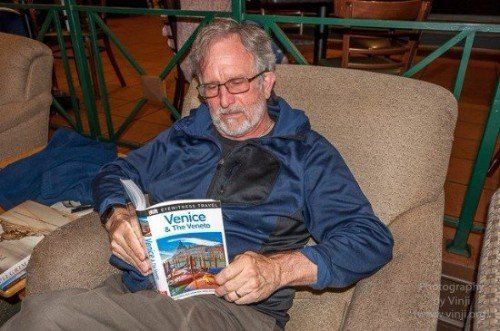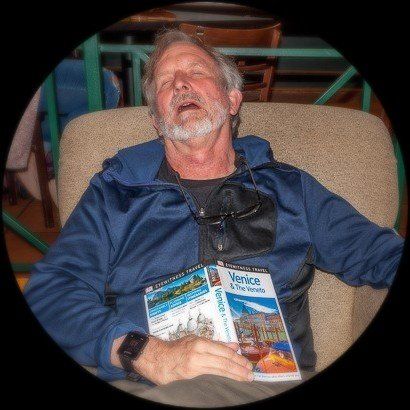My Intimate Relationship with Books VI
Jilted Lovers
"I have a low opinion of books; they are but piles of stone
set up to show coming travelers where other minds have been…No amount of
word-making will ever make a single soul know these mountains…One day's
exposure to mountains is better than cartloads of books. See how willingly
Nature poses herself upon photographers' plates. No earthly chemicals are so
sensitive as those of the human soul. "
~John
Muir, In His Own Words
, p. 23
The last few weeks I have been talking about my intimate relationships with books, and shown how books have cracked me open, opened my eyes, touched me emotionally, elicited sensory pleasure and nostalgia just by turning pages or taking a whiff of their distinct scent, been brutally honest with me, and yet encouraged me to dream. In many ways, books have been dear friends. In other ways, spiritual gurus. In still others, masters-to-my-apprentice. In yet another, magicians who have opened my eyes to wonder and fantasy and possibility. In the most important way, they have been pathfinders, showing the trail and breaking through cover to views and worlds I otherwise would never have imagined, much less taken seriously, had they not taken me by the hand.
But, truth be told, my favorite books are not monogamous, they rightly go on to be loved by others who read them just as passionately. As in Casablanca , these jilting lovers are books that (following Rick here) have “got a job to do, too. Where I’m going, you can’t follow. What I’ve got to do, you can’t be any part of”.
OK, it’s a stretch to say used volumes are like Rick leaving Ilsa for a higher purpose, but not by much.
To cap this series about books, let’s summarize some of the ways reading books can contribute to profound living and learning.
First , let’s be clear. Reading books can never take the place of direct experience, but they can expose us - open us up - to places, people, times, and perspectives not yet unexplored. Reading about Venice is not the same as visiting Venice. Reading about romance is not the same as romance itself. Reading Shakespeare is great for people who can deal with, well, Shakespeare, but going to see The Merchant of Venice is likely to be a visceral experience, and participating in a Shakespearean production, in whatever capacity, might be lifechanging. Reading about walking the Camino de Santiago cannot replace the pilgrimage itself. I have been told at various times and by various people to read less and to do more. It is good advice.
However, second, reading books widely will deepen and expand our existing knowledge and enrich our lives. Even though John Muir said he had a low opinion of books, I had to read what he said about them, and about Cathedral Peak, and about everything else he said when describing his experiences, in a book. Venice didn’t interest me until I took a quick overnight trip there, and then it fascinated me. There, I bought I book about the history of Venice and was smitten. Such an interesting spot which played a big part in history that I never would have known anything about had I not hopped a train on a last-minute whim.
Reading books takes us to places most of us will never step upon. I’ve never been to Yosemite National Park, yet, but reading the words of those who have, like a John Muir, can get me closer, can motivate me to step out of my routine way of thinking and acting, can push me to life more fulfilling. These days, for true book lovers, there are even "book towns" to visit, combining both experience and reading about experience. These small places might turn into mini-pilgrimages for bibliophiles, those book lovers with a wandering eye. After such a tryst, these book lovers might always have Hobart, New York.
“This I may say is the first time I have been at church in California, led here at last, every door graciously opened for the poor family worshiper” (September 7, 1869, Atop Cathedral Peak, the first person to climb it.) (John Muir, In His Own Words , p. 14).
Third , except in totalitarian states, communities, or cultures which restrict access to books (see book burning , book banning ) reading, for those who can read , has the benefit of being available to anyone who is interested in any topic, even about those taboo subjects which their church or culture or school or family won’t allow to be discussed but which is an area of interest. For the inquisitive, the curious, reading is a safe way to dip one’s toes into different philosophies or ideologies or cultures or experiences without having to justify the exploration to others. That, of course, can lead to risky ideas or questioning the status quo, so legit cave , reader beware, it might be a disquieting experience in addition to all my blathering about benefits I bloviated about before. Writers have always pushed the status quo; that is at least part of what all the arts are supposed to be doing, after all.
Readers, abandon all nope, ye who enter here
* – you have permission to think and imagine and question.
Reading is a safe place to explore ideas and to build the capacity to view concepts through multiple lenses without the hammer of social judgment pounding those thoughts, those ideas down to conformity, especially if we will push ourselves to read outside our tried-and-true authors and normal sources.
Fourth , I believe reading is important no matter the vehicle – social media, blogs, internet searches, letter writing and more - but one of the purposes of this essay is to emphasize the value of reading books and, in particular, books with actual covers and pages that you hold in your hands. I want to encourage the practice of book reading in the routines of our lives. So here are some specific reasons books should have a special place in every individual’s regular practice.
Nicolas Carr’s The Shallows (2011) famously described the dangers of “outsourcing” our memory to the internet. The Shallows provides compelling arguments for contemplation and reading books. “As our use of the Web makes it harder to lock information into our biological memory”, he says, “we’re forced to rely more and more on the Net’s capacious and easily searchable artificial memory, even if it makes us shallower thinkers” (p. 194). Relying primarily on the internet actually changes our brain, he says, reducing our attention span and ability make our own connections between ideas, and thus limits our ability to think conceptually. “When we outsource our memory to a machine, we also outsource a very important part of our intellect and even our identity” (p. 195), he warns.
Writing about the feedback he received from his book, Carr says, “Dozens of people wrote to share their own stories of how the Web has scattered their attention, parched their memory, or turned them into compulsive nibblers of info-snacks” (p. 226). The ubiquitous internet, Carr says, also encroaches upon the time we take to meditate. “The tumultuous advance of technology could…drown out the refined perceptions, thoughts, and emotions that arise only through contemplation and reflection” (p. 222).
“Once I was a scuba diver in the sea of words. Now I zip along the surface like a guy on a Jet Ski” ~Nicholas Carr, The Shallows: What the Internet is Doing to Our Brains , 2011, p. 7.
Next, though I am not an expert on the research, theory, or practice of reading, people like Dr. Maryanne Wolf , are. Wolf, who is the director of the Center for Reading and Language Research at Tufts University and author of Proust and the Squid: The Story and Science of the Reading Brain, defines deep reading with her colleague Mirit Barzilla (2009):
“By deep reading, we mean the array of sophisticated processes that propel comprehension and deductive reasoning, analogical skills, critical analysis, reflection, and insight” (p. 33).
Oh, that.
Wolf and Barzilla say that digital text, say an e-book, has high potential for encouraging deep thought, creativity, learning, and discovery. Still, it takes a lot of fortitude to stay focused on an online article or digital book with all the opportunities to scan social media and other information that comes blitzing at the reader. They show how deep reading online can be encouraged. Yet, when talking about finding the best of both worlds, print and digital, when teaching children, they say “Until sufficient proof enlarges the discussion, we believe that nothing replaces the unique contributions of print literacy (italics added) for the development of the full panoply of the slower, constructive, cognitive processes that invite children to create their own whole worlds in what Proust called the ‘reading sanctuary’” (37).
Reading books, much like radio did before television, gives our brains the opportunity to fill in the blanks (check out my brother’s review of The Shape of Water over at T he Profound Bartender to see how we sometimes “fill in the blanks” watching movies), to develop pictures of characters in our minds, and to consider how ideas or challenges presented might work out along the way. Unlike the simple process of finding answers to questions via a quick Google search, reading books engages the mind in imagining, creating, conceptualizing, questioning, and so much more.
“Deep reading – the kind that you engage in when you get lost in the syntax and imagery and the long, convoluted sentences of a really meaty book – is a special sort of exercise that creates a new part of the brain that did not exist at birth.”
~Michelle Slatalla, The Endless First Chapter , NYTs, 12-7-09
Michelle Slatalla, the author of the article “The Endless First Chapter” begins by sharing her frustration as she tries to read the first chapter of a book, only to be sidetracked by a Wikipedia search, checking her email, hearing a message roll in on her iPhone, and, well, you get the idea. She used to read books all the time, she laments. Now, not so much.
Are you one of those people who once loved reading books but now find your attention span is limited to email, tweets, blogs, and other quick and easy reading? Was even this short essay difficult to finish (Yes, I know it could be the poor writing, but bear with me….). If so, I encourage you to give it another go, like Slatalla did. There are so many books that will engage you immediately, like my mom’s old Louis L’Amour stories or today’s Larry McMurtry novels or pick your favorite genre, if you’ll just give them a try.
I know three authors , with three different audiences, who will engage a reader right off the bat . I am lucky to have such creative people as friends. One, Cathy Maxwell, I have known since high school nearly a half century ago. I’ll come back to these folks time and again in these essays I’m sure but, for now, consider the work of Antonia Cardella. I love her Two Fine Ladies books, for children aged four to eight, which she wrote and illustrated herself. She is a wonderfully imaginative artist, and also has produced Zendoodle coloring books for adults.
I knew Cathy Maxwell (nee Cathy Wollen, aka Doc Wollen’s kid) when we were students at Olathe (KS) High School, and then in the theater arts program at Washburn University. I lost track of her for decades and when we reconnected I discovered she had become a New York Times bestselling author. She writes romance novels (I tell her that I want to be in the room for the book cover photo shoots, oh my goodness), and her latest is called A Match Made in Bed. If you are having a hard time reading a novel, may I suggest page one of any of Cathy’s books. It will be a Match Made to be Read.
Third, is AK (Amanda) Turner. I just wrote about her on my Profound Living Facebook page , and, because I like her writing – her whole irreverent style – so much, I want to mention her here again because her books are so readable, so funny, so insightful, that anyone wanting to get back into the habit of reading can start right here. Her Vagabonding with Kids series describes her adventures traveling with her family across the globe, and these stories would be such an entertaining way to get back into the reading habit. Her Facebook page is hoot enough, but try out her books.
These are just three authors, in just three (or four or five depending on how you count) genres, out of the whole panoply of topics you might find fascinating.
Please make reading books a part of your life, if it isn’t already. The rewards are rich.
This is the last of the My Intimate Relationships with Books series, and writing these essays has been a joyful experience. I like to write about things I want to learn more about, so next we will focus on grateful living and how the daily practice of gratitude helps us to appreciate the abundance in our lives.
*With a tip of the hat to Dante , “Abandon all hope, ye who enter here.” “Lasciate ogni speranza, voi che entrate.”
References:
Carr, N. G. (2011). The shallows: what the Internet is doing to our brains (Norton pbk. ed. ed.). New York: W.W. Norton.
Dante, A. (2003). The divine comedy: the inferno, the purgatorio, and the paradiso (J. Ciardi, Trans.). New York: New American Library.
Muir, J. (1988). John Muir, in his own words: a book of quotations (P. Browning Ed.). Lafayette, Calif.: Great West Books.
Norris, G. B. (2008). Simple ways: towards the sacred. New York: BlueBridge.
Slatalla, M. (2009). The Endless First Chapter. New York Times . Retrieved from http://www.nytimes.com/2009/12/10/fashion/10SPY.html
Wolf, M., & Barzillai, M. (2009). The Importance of Deep Reading . Educational Leadership, 66(6), 32.
Wolf, M. (2007). Proust and the squid: the story and science of the reading brain (1st ed.). New York, NY: HarperCollins.













